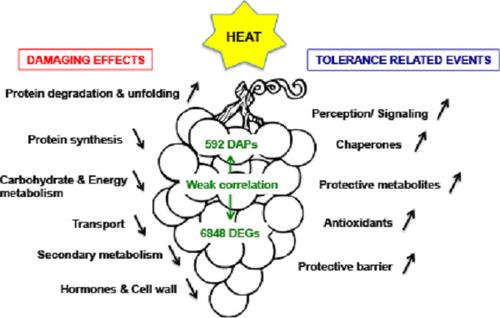当前位置:
X-MOL 学术
›
J. Integr. Plant Biol.
›
论文详情
Our official English website, www.x-mol.net, welcomes your
feedback! (Note: you will need to create a separate account there.)
Proteomic and metabolomic profiling underlines the stage- and time-dependent effects of high temperature on grape berry metabolism.
Journal of Integrative Plant Biology ( IF 9.3 ) Pub Date : 2020-01-31 , DOI: 10.1111/jipb.12894 David Lecourieux 1 , Christian Kappel 2 , Stéphane Claverol 3 , Philippe Pieri 1 , Regina Feil 4 , John E Lunn 4 , Marc Bonneu 3 , Lijun Wang 5 , Eric Gomès 1 , Serge Delrot 1 , Fatma Lecourieux 6
Journal of Integrative Plant Biology ( IF 9.3 ) Pub Date : 2020-01-31 , DOI: 10.1111/jipb.12894 David Lecourieux 1 , Christian Kappel 2 , Stéphane Claverol 3 , Philippe Pieri 1 , Regina Feil 4 , John E Lunn 4 , Marc Bonneu 3 , Lijun Wang 5 , Eric Gomès 1 , Serge Delrot 1 , Fatma Lecourieux 6
Affiliation

|
Climate change scenarios predict an increase in mean air temperatures and in the frequency, intensity, and length of extreme temperature events in many wine‐growing regions worldwide. Because elevated temperature has detrimental effects on berry growth and composition, it threatens the economic and environmental sustainability of wine production. Using Cabernet Sauvignon fruit‐bearing cuttings, we investigated the effects of high temperature (HT) on grapevine berries through a label‐free shotgun proteomic analysis coupled to a complementary metabolomic study. Among the 2,279 proteins identified, 592 differentially abundant proteins were found in berries exposed to HT. The gene ontology categories “stress,” “protein,” “secondary metabolism,” and “cell wall” were predominantly altered under HT. High temperatures strongly impaired carbohydrate and energy metabolism, and the effects depended on the stage of development and duration of treatment. Transcript amounts correlated poorly with protein expression levels in HT berries, highlighting the value of proteomic studies in the context of heat stress. Furthermore, this work reveals that HT alters key proteins driving berry development and ripening. Finally, we provide a list of differentially abundant proteins that can be considered as potential markers for developing or selecting grape varieties that are better adapted to warmer climates or extreme heat waves.
中文翻译:

蛋白质组学和代谢组学分析强调了高温对葡萄浆果代谢的阶段和时间依赖性影响。
气候变化情景预测,全球许多葡萄酒产区的平均气温以及极端温度事件的频率,强度和持续时间都会增加。由于高温对浆果的生长和成分产生不利影响,因此威胁到葡萄酒生产的经济和环境可持续性。使用赤霞珠果实切块,通过无标记shot枪蛋白质组学分析和补充的代谢组学研究,研究了高温(HT)对葡萄浆果的影响。在鉴定出的2279种蛋白质中,在暴露于HT的浆果中发现了592种差异丰富的蛋白质。在HT下,主要改变了基因本体类别“压力”,“蛋白质”,“二次代谢”和“细胞壁”。高温严重损害碳水化合物和能量代谢,其作用取决于发展阶段和治疗时间。转录物含量与HT浆果中的蛋白质表达水平相关性很差,这突出了蛋白质组学研究在热应激环境下的价值。此外,这项工作揭示了HT改变了驱动浆果发育和成熟的关键蛋白质。最后,我们提供了一系列差异丰富的蛋白质,这些蛋白质可以被视为开发或选择更适合温暖气候或极端热浪的葡萄品种的潜在标志。强调蛋白质组学研究在热应激环境下的价值。此外,这项工作揭示了HT改变了驱动浆果发育和成熟的关键蛋白质。最后,我们提供了一系列差异丰富的蛋白质,这些蛋白质可以被视为开发或选择更适合温暖气候或极端热浪的葡萄品种的潜在标志。强调蛋白质组学研究在热应激环境下的价值。此外,这项工作揭示了HT改变了驱动浆果发育和成熟的关键蛋白质。最后,我们提供了一系列差异丰富的蛋白质,这些蛋白质可以被视为开发或选择更适合温暖气候或极端热浪的葡萄品种的潜在标志。
更新日期:2020-01-31
中文翻译:

蛋白质组学和代谢组学分析强调了高温对葡萄浆果代谢的阶段和时间依赖性影响。
气候变化情景预测,全球许多葡萄酒产区的平均气温以及极端温度事件的频率,强度和持续时间都会增加。由于高温对浆果的生长和成分产生不利影响,因此威胁到葡萄酒生产的经济和环境可持续性。使用赤霞珠果实切块,通过无标记shot枪蛋白质组学分析和补充的代谢组学研究,研究了高温(HT)对葡萄浆果的影响。在鉴定出的2279种蛋白质中,在暴露于HT的浆果中发现了592种差异丰富的蛋白质。在HT下,主要改变了基因本体类别“压力”,“蛋白质”,“二次代谢”和“细胞壁”。高温严重损害碳水化合物和能量代谢,其作用取决于发展阶段和治疗时间。转录物含量与HT浆果中的蛋白质表达水平相关性很差,这突出了蛋白质组学研究在热应激环境下的价值。此外,这项工作揭示了HT改变了驱动浆果发育和成熟的关键蛋白质。最后,我们提供了一系列差异丰富的蛋白质,这些蛋白质可以被视为开发或选择更适合温暖气候或极端热浪的葡萄品种的潜在标志。强调蛋白质组学研究在热应激环境下的价值。此外,这项工作揭示了HT改变了驱动浆果发育和成熟的关键蛋白质。最后,我们提供了一系列差异丰富的蛋白质,这些蛋白质可以被视为开发或选择更适合温暖气候或极端热浪的葡萄品种的潜在标志。强调蛋白质组学研究在热应激环境下的价值。此外,这项工作揭示了HT改变了驱动浆果发育和成熟的关键蛋白质。最后,我们提供了一系列差异丰富的蛋白质,这些蛋白质可以被视为开发或选择更适合温暖气候或极端热浪的葡萄品种的潜在标志。











































 京公网安备 11010802027423号
京公网安备 11010802027423号